
Mina Anna Mazzini or Mina Anna Quaini, known mononymously as Mina, is an Italian singer and actress. She was a staple of television variety shows and a dominant figure in Italian pop music from the 1960s to the mid-1970s, known for her three-octave vocal range, the agility of her soprano voice, and her image as an emancipated woman.
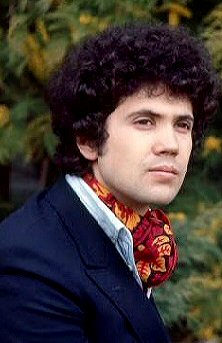
Lucio Battisti was an Italian singer-songwriter and composer. He is widely recognized for songs that defined the late 1960s and 1970s era of Italian songwriting.

Giulio Rapetti, best known as Mogol, is an Italian music lyricist. He is best known for his collaborations with Lucio Battisti, Gianni Bella, Marcella Bella, Adriano Celentano and Mango.
Cantagiro was an Italian summer song contest held from 1962 to 1972 and 1990 to 1993. It featured three categories, A for famous artists, B for newcomers and C for groups. The creator of the competition was Ezio Radaelli. The name of the festival was a reference to the bicycle race Giro d'Italia, and, as the Giro, Cantagiro was organized as a stage race consisting of eleven or twelve daily stages, each set in a different city. A peculiar characteristic of the festival was that, while traveling between one stage and the other, singers were required to travel in an open car, to be at the disposal of the crowd of fans, otherwise risking fines or disqualification from the competition; accordingly the travel usually resolved into a huge crowd, with fans waiting their idols in every corner of the path.
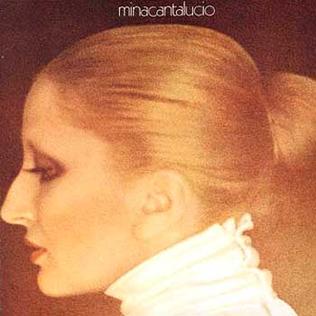
Minacantalucio is a studio album by Italian singer Mina, released in October 1975 by PDU and distributed by EMI Italiana.
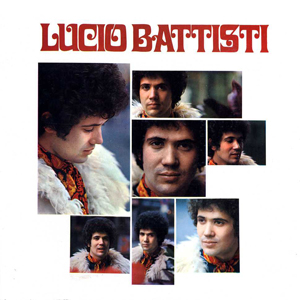
Lucio Battisti is the debut studio album by the Italian singer-songwriter Lucio Battisti. It was released in March 1969 by Dischi Ricordi.

Their 16 Greatest Hits is the third compilation album by the American rock band the Grass Roots. It was originally released by Dunhill Records in September 1971 shortly after the success of "Sooner or Later" earlier that year. The album also included many other hit singles that were released from 1966 to 1971. The album was released on both stereo LP & tape as well as in Quadraphonic Sound on both LP & tape. This album was the only Quadraphonic album released by The Grass Roots.

The Rokes were a pop rock band formed in 1963 in Italy by English expatriates. Their most successful songs included "Piangi con me", the original version of "Let's Live for Today", a US hit when covered by The Grass Roots; and "Che colpa abbiamo noi", an Italian-language version of "Cheryl's Going Home" by Bob Lind.
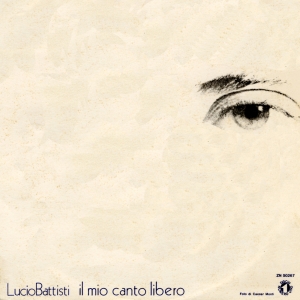
"Il mio canto libero" is a song written by Italian singer-songwriter Lucio Battisti and lyricist Mogol. The song was recorded by Battisti for the album of the same title, and released as a single in November 1972 for Mogol's recording label Numero Uno. The song was a commercial success in Italy, topping the Musica e dischi singles chart for nine consecutive weeks in 1973 and becoming the third best-selling single of the year. During the following years, it was covered by several artists, and it became a classic of Italian popular music. It was certified double platinum by the Federation of the Italian Music Industry in 2024, for domestic equivalent sales exceeding 200,000 units since 2009.

Lucio Battisti Vol. 2 is the second studio album by the Italian singer-songwriter Lucio Battisti. It was released in July 1970 by Dischi Ricordi.

"Amarsi un po'" is a song composed by Lucio Battisti and Mogol, and performed by Lucio Battisti. It was released as a single in March 1977, with "Sì, viaggiare" as B-side. The single peaked at first place ten weeks on the Italian hit parade and was the most sold single of the year in Italy. The same year Battisti released an English version of the single for international markets, with the two songs renamed "To Feel in Love" and "Keep on Cruising" and with lyrics by Peter Powell. They were included in the album Images.
"E penso a te" is a song composed in 1970 by Lucio Battisti based on the lyrics by Mogol. Initially sung by Bruno Lauzi, it was subsequently re-recorded by numerous other artists. The most popular version remains the one which its author gave in 1972.

Golden Grass is the first greatest hits album by the American rock band the Grass Roots, released in November 1968 by Dunhill Records. The LP's release in the fall of 1968 followed the success of the group's highest-charting single, "Midnight Confessions". It featured a song written by Carole King and Toni Stern titled "Lady Pleasure", which was previously unreleased by the group, as well as a new single, "Bella Linda", which was originally written by the Italian songwriting duo of Lucio Battisti and Mogol. The Grass Roots' version of the song, which was given English lyrics by Barry Gross and Steve Barri, charted at No. 28. Golden Grass is the highest charting Grass Roots album at #25, and was certified gold by the RIAA in 1970.
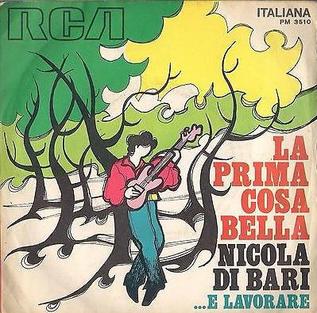
"La prima cosa bella" is a song composed by Nicola Di Bari and Mogol. The song ranked second at the twenth edition of the Sanremo Music Festival, with a double performance by Nicola Di Bari and Ricchi e Poveri.

"29 settembre" is a song composed in 1966 by Italian musician Lucio Battisti and lyricist Mogol and brought to success by Equipe 84 in March 1967. It topped the Italian charts for five weeks and led to Battisti's definitive affirmation as a composer. It is Notable for the innovative lyrics and sound heavily influenced by psychedelia, so much so that the song is nicknamed "Italy's Sergeant Pepper's" for the impact and the influence it had on the Italian music scene.

"Amor mio" is a song recorded by Italian singer Mina in 1971 for her self-titled studio album. The song was written by Lucio Battisti and Mogol, and arranged by Gian Piero Reverberi.
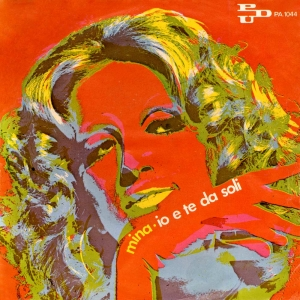
"Io e te da soli" is a song by Italian singer Mina. The song was written by Mogol and Lucio Battisti.

"Insieme" is a song by Italian singer Mina, released by PDU in May 1970 as a lead single from her studio album ...quando tu mi spiavi in cima a un batticuore.... The song became one of Mina's most successful.

"Acqua azzurra, acqua chiara" is a 1969 song composed by Lucio Battisti (music) and Mogol (lyrics) and performed by Lucio Battisti.
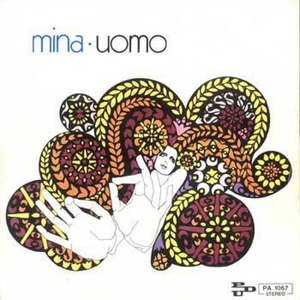
"Uomo" is a song by Italian singer Mina. It was written by Enrico Riccardi with lyrics by Luigi Albertelli.


















